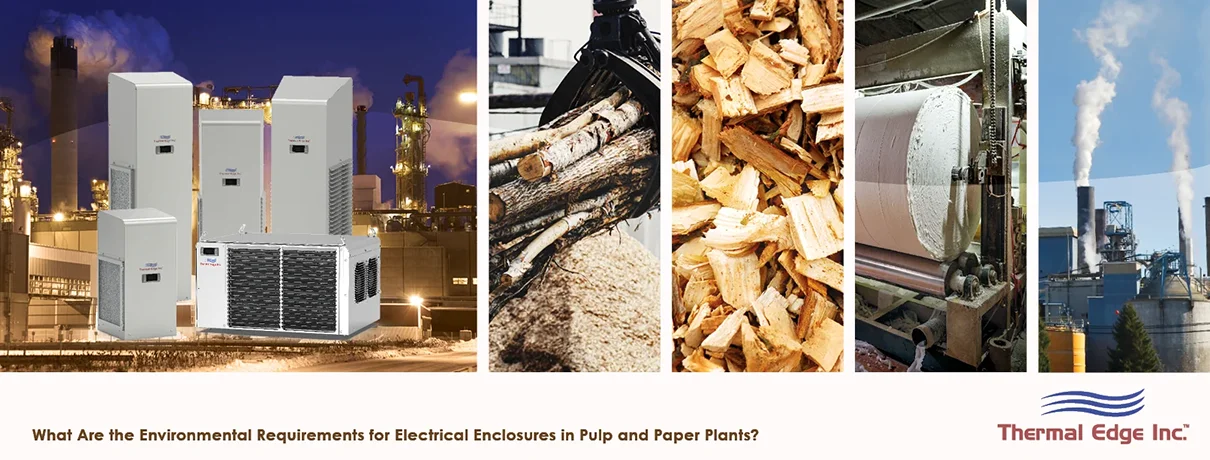What Are the Environmental Requirements for Electrical Enclosures in Pulp and Paper Plants?

Pulp and paper manufacture is a complex process involving the chemical or mechanical preparation of wood pulp and the manufacture of paper products on high speed paper-making machines. These processes take place in environmental conditions that impact on electrical enclosures in different ways. The processes include:
- Wood chipping: Large mechanical handling equipment is used for debarking wood and breaking it up into small chips.
- Chemical pulp mills: Chemical preparation of wood pulp from wood chips in a hot, damp, and highly corrosive atmosphere.
- Mechanical pulp mills: Mechanical preparation of wood pulp using steam, water, and mechanical grinding machines.
- Paper machines: Manufacture of paper-based products from pulp on high speed machines that depend upon precise speed control.
Wood Yards and Chipping
Electrical enclosures in these plant areas may be situated outdoors and subject to weather and solar radiation or indoors, where they may be subject to high humidity from steam heating processes and the possibility of inadvertent water spray from water used in the chipping process. These enclosures should be sealed to prevent water ingress and fitted with enclosure air conditioners to maintain electrical equipment at a safe working temperature. Recommendations for enclosure air conditioners in this environment would include:
- Standard NEMA 12 mild steel enclosure: Dry indoor areas.
- Weatherproof NEMA 4X stainless steel enclosure: Outdoor areas and wet, humid areas, especially where there is a risk of water spray.
- Filter hoods: Fitted where there is excessive moisture and water spray.
Pulp Preparation Areas
These areas are characterized by high levels of humidity, heat, and the use of corrosive chemicals, including sodium hydroxide and sodium sulfide, which could lead to a corrosive atmosphere. Recommendations for enclosure air conditioners would include the use of:
- Weatherproof NEMA 4X stainless steel enclosures: For corrosion protection and to limit ingress of water.
- Filter hoods: To prevent excessive moisture from being drawn into the condenser section of the enclosure air conditioner.
- Corrosion protection of condenser coil: To reduce the risk of corrosion by chemical vapor.
- Remote monitoring: Provision of remote monitoring in control rooms to monitor operation of enclosure air conditioner.
Paper Machines
DC and AC variable drives used on paper machines produce a lot of heat that must be removed to prevent drives tripping or becoming unstable. Conventional fan cooling will be ineffective due to high ambient temperatures in motor control centers.
Electrical enclosures located close to or under the paper machine should comply with the recommendations for equipment in the pulp plant. However, instead of a standard condenser filter with a filter hood, a 2” pleated filter is recommended to lengthen the filter maintenance interval.
Recommendations for electrical drive enclosures located away from the machine are:
- Standard NEMA 12 mild steel panels: Located in a dry environment.
- Remote monitoring of temperature: Temperatures in drive enclosures should be monitored from the control room.
Air Conditioning of Electrical Enclosures Improves Mill Reliability
The hot, damp, and humid environment present in pulp and paper mills presents unique challenges for the protection of electrical enclosures that require taking steps to keep enclosures cool and dry. This can be achieved by ensuring electrical enclosures are well sealed and using enclosure air conditioners to ensure electrical enclosure temperature is controlled. High speed electrical drives used on paper machines generate a significant amount of heat, requiring enclosure air conditioning to remove heat and to maintain the temperature in the electrical drive enclosures within parameters so as to avoid unexpected speed variations that could lead to a paper break or pile up.
If you would like further information on how enclosure air conditioning can help you, please contact us at Thermal Edge.
